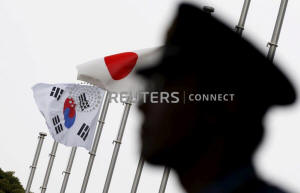South Korea warns Japan of security pact risk, calls for 'cooling-off'
in trade row
 Send a link to a friend
Send a link to a friend
 [August 03, 2019]
By Hyonhee Shin [August 03, 2019]
By Hyonhee Shin
BANGKOK (Reuters) - South Korea is exploring all options in a bitter
trade row with Japan, including scrapping an intelligence sharing pact,
but wants a cooling off period with Tokyo, a senior South Korean
official said on Saturday.
The trade row escalated on Friday when Japan removed South Korea from a
favored trading nations list, prompting Seoul to warn it would not be
defeated again by its neighbor, laying bare decades-old war time
animosity.
South Korea may consider revoking a military information sharing pact as
a countermeasure, a view raised during a trilateral foreign ministers'
meeting with the United States and Japan on Friday in Bangkok, said the
South Korean official.
The accord, the General Security of Military Information Agreement (GSOMIA),
facilitates three-way intelligence gathering with Washington, and is
crucial for both South Korea and Japan in dealing with North Korea's
nuclear and missile threats. The deal is automatically renewed annually
on Aug. 24.

"GSOMIA plays a quite significant part in three-way security
cooperation," said the official told reporters on the sidelines of a
regional security forum in Bangkok.
"We've made clear that for our part, we are in a situation to put all
options on the table."
The trade dispute has intensified since Japan imposed curbs last month
on exports to South Korea of three high-tech materials needed to make
memory chips and display panels, threatening the global supply chain.
[to top of second column]
|

A police officer
stands guard near Japan and South Korea national flags at a hotel,
where the South Korean embassy in Japan is holding the reception to
mark the 50th anniversary of the normalisation of ties between Seoul
and Tokyo, in Tokyo June 22, 2015. REUTERS/Toru Hanai/File Photo

The move was seen as a response to a South Korean court ruling last
year that ordered Japanese firms to compensate some of their wartime
forced laborers, though Tokyo cited unspecified security reasons.
Japan says the issue of forced labor was settled by a 1965 treaty
that normalized ties between the two countries.
The South Korean official said a "cooling-off period" with Japan was
necessary to craft a solution.
"The export curbs confined room for diplomacy for both sides, and
the situation is now even more difficult due to another retaliatory
measure," said the official, referring to Japan's actions on Friday.
"It's difficult to think about a long-term strategy under such a
heightened, agitated situation."
(The story is refiled to fix typo.)
(Reporting by Hyonhee Shin; Editing by Michael Perry)
[© 2019 Thomson Reuters. All rights
reserved.]
Copyright 2019 Reuters. All rights reserved. This material may not be published,
broadcast, rewritten or redistributed.
Thompson Reuters is solely responsible for this content.
 |